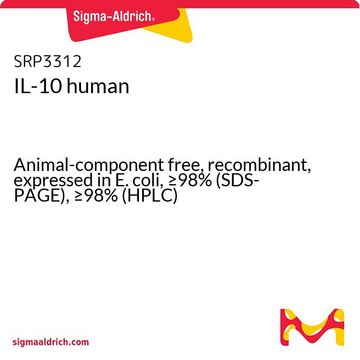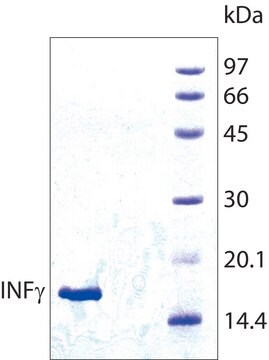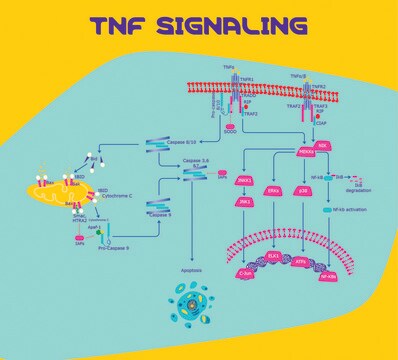I9276
Interleukin-10 human
≥97% (SDS-PAGE), recombinant, expressed in baculovirus infected Sf21 cells, lyophilized powder, suitable for cell culture
Synonym(s):
IL-10
Sign Into View Organizational & Contract Pricing
All Photos(1)
About This Item
Recommended Products
biological source
human
Quality Level
recombinant
expressed in baculovirus infected Sf21 cells
Assay
≥97% (SDS-PAGE)
form
lyophilized powder
potency
0.1-0.5 ng/mL EC50
mol wt
18 kDa
packaging
pkg of 5 μg
technique(s)
cell culture | mammalian: suitable
impurities
endotoxin, tested
UniProt accession no.
storage temp.
−20°C
Gene Information
human ... IL10(3586)
Looking for similar products? Visit Product Comparison Guide
Application
Interleukin-10 (IL-10) human has been used to study the effect of IL-10 on cartilage proteoglycan turnover. It has been used as an antigen to analyse the reactivity patterns of autoantibodies in healthy humans and humans suffering from type 1 diabetes mellitus.
Biochem/physiol Actions
IL-10 is an important regulator of the functions of lymphoid and myeloid cells. IL-10 can block the activation of cytokine synthesis and several accessory functions of macrophages. Human and mouse IL-10 share a 73% sequence homology. However, human IL-10 acts on both human and mouse target cells, while mouse IL-10 has species-specific activity. In mouse, the cellular sources of IL-10 consist of Th2 cells, activated fetal thymocytes, macrophages, keratinocytes, LY-1+ (CD5+), and normal B cells. In human, the cellular sources of IL-10 consist of CD4+ T cells and T cell clones, thymocytes, B cells, B cell lymphomas, macrophages, mast cell lines and keratinocytes. IL-10 stimulates the growth of stem cells, mast cells and thymocytes. IL-10 enhances cytotoxic T cell development, and co-stimulates B cell differentiation and Ig secretion. IL-10 regulates angiogenesis by inducing the cell-type dependent expression of either angiogenic or angiostatic factors.
Interleukin-10 regulates lymphoid and myeloid cell functions. It blocks the activation of cytokine synthesis and several accessory functions of macrophages. IL-10 enhances cytotoxic T cell development and co-stimulates B cell differentiation and Ig secretion. IL-10 regulates angiogenesis by inducing cell-type dependent expression of either angiogenic or angiostatic factors.
Physical form
Lyophilized from a 0.2 μm filtered solution of phosphate buffered saline, pH 7.4, containing 50 μg bovine serum albumin/μg IL-10
Storage Class Code
11 - Combustible Solids
WGK
WGK 3
Flash Point(F)
Not applicable
Flash Point(C)
Not applicable
Personal Protective Equipment
dust mask type N95 (US), Eyeshields, Gloves
Choose from one of the most recent versions:
Already Own This Product?
Find documentation for the products that you have recently purchased in the Document Library.
Customers Also Viewed
Digitoxin metabolism by rat liver microsomes.
A Schmoldt et al.
Biochemical pharmacology, 24(17), 1639-1641 (1975-09-01)
Francisco J Quintana et al.
Journal of autoimmunity, 21(1), 65-75 (2003-08-02)
Informatic methodologies are being applied successfully to analyze the complexity of the genome. But beyond the genome, the immune system reflects the state of the body in health and disease. Traditionally, immunologists have reduced the immune system, where possible, to
Hiroko Tsuji et al.
Circulation research, 106(10), 1613-1623 (2010-05-29)
Amniotic membrane is known to have the ability to transdifferentiate into multiple organs and is expected to stimulate a reduced immunologic reaction. Determine whether human amniotic membrane-derived mesenchymal cells (hAMCs) can be an ideal allograftable stem cell source for cardiac
Martina Severa et al.
Journal of interferon & cytokine research : the official journal of the International Society for Interferon and Cytokine Research, 35(9), 668-681 (2015-04-30)
Plasmacytoid dendritic cells (pDCs) display altered immune-phenotype in multiple sclerosis (MS) patients and are found actively recruited in postmortem MS brain lesions, implying that their immune regulation may represent an important aspect of MS pathogenesis. Because of the reported Toll-like
Adriana Weinberg et al.
PloS one, 10(4), e0122431-e0122431 (2015-04-16)
Influenza infections have high frequency and morbidity in HIV-infected pregnant women, underscoring the importance of vaccine-conferred protection. To identify the factors that determine vaccine immunogenicity in this group, we characterized the relationship of B- and T-cell responses to pandemic H1N1
Our team of scientists has experience in all areas of research including Life Science, Material Science, Chemical Synthesis, Chromatography, Analytical and many others.
Contact Technical Service










